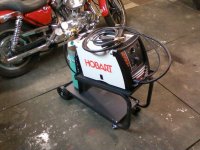joshuabardwell
Elite Member
is Tractor Supply competitive on the small steel pieces they sell, or should I be going to a welding supply house where I'll get
my rods? I need cheap practice material. Junk yard? Most stuff is recycled around here but I likely don't know the good hidey holes.
TSC, Home Depot, etc... are the most expensive places you can buy metal. Perhaps 2-3x the price of a steel supplier, and 4-6x the price of a scrap yard. You want to find a scrap yard that sells to the public (some only take metal for recycling). The metal will be rusty, but will be sound. Near New Holland, PA, Delaware Valley Scrap looks promising. I would also check Sullivan Scrap.
